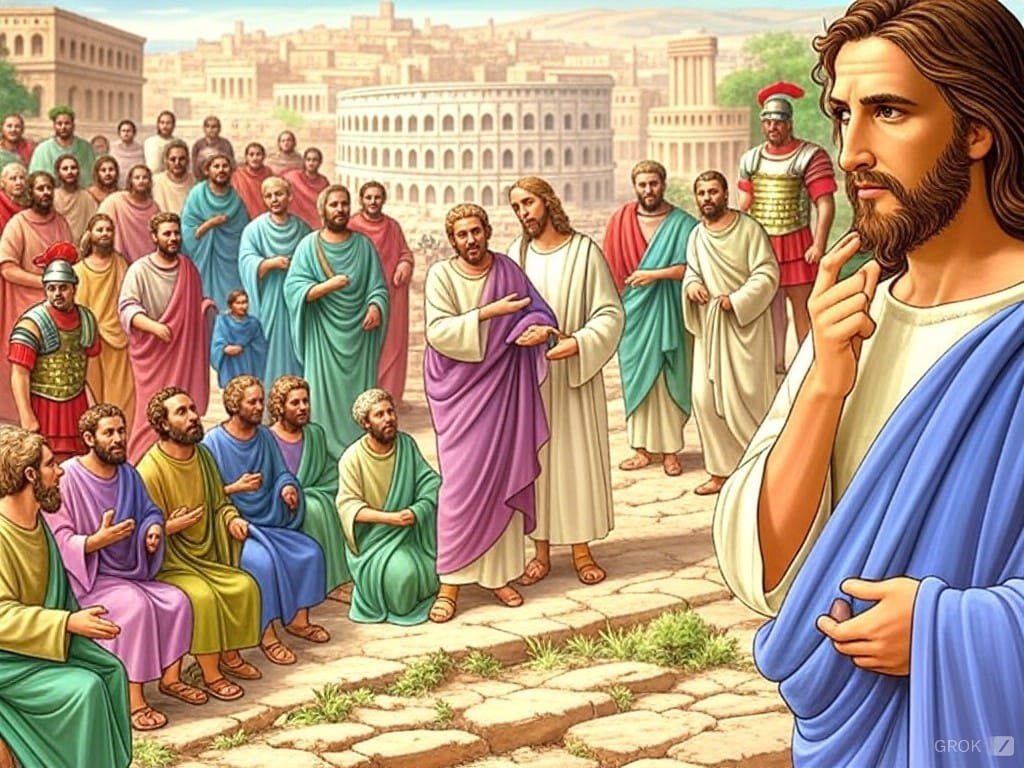
Justice Katju Explores How Jesus Christ's Mission to Reform Jewish Society Birthed Global Christianity
How Christianity arose and spread in the world
By Justice Katju
Since Christmas is approaching on 25th December, this article may be of interest to many
Many accounts have been given as to how Christianity arose and spread in the world e, g, in Gibbon’s ‘Decline and fall of the Roman Empire’. However, I will give my own view, though it will be somewhat long.
Jesus Christ is said to have been the creator of Christianity, though the truth is he had no Intention of creating any religion, but only wanted to reform Jewish society, as it had been corrupted and degenerated by the Jewish priests of those days.
Though Israel ( Judea) had come under Roman rule, the Romans, while keeping their troops and a Roman Governor there, gave a certain degree of autonomy to the Jews by allowing some Jewish high priests a share in the government,
These Jewish priests in course of time had become highly corrupt,
Jesus was a young man who allegedly had visions of God ( like Prophet Muhammad) and he went around preaching the word of God and telling people to repent for their evil ways, thus acquiring a huge following,
So far the Jewish priests did not bother, But when he raised a hue and cry against their corruption they became very upset, particularly when he entered the holiest shrine of the Jews, their Temple in Jerusalem, and overturned the tables of the money changers.
It was then that the Jewish priests felt that they had had enough, Jesus had crossed the line, according to them, and they demanded his death,
It is said that the Roman Catholic Church will overlook attacks on 37 of it’s 38 principles, but strongly oppose confiscation of one thirty eighth of it’s property, In other words, people react strongly when their economic interests are affected or are endangered
The economic vested interests of the Jewish priests were endangered by Jesus, as he demanded that they stop their corruption. Consequently they decided to eliminate him,
Now only the Roman Governor, who at that time was Pontius Pilate, could sentence a man to death. So they went to Pilate and demanded Jesus’ death.
However, when Pilate asked what wrong had Jesus done, they could only give a specious argument that he had claimed to be king of the Jews,
Pilate could have rejected this specious plea, but being a practical man, like other Roman administrators, he decided to give in to their demand and passed the death sentence, though after washing his hands ( to indicate he was not responsible for this gross injustice).
Jesus was then crucified, which was a horrible manner of execution.
His disciples and followers were shocked at this outrageous injustice,, and they resolved to continue and spread his message among the Jews,
Now even before Jesus’ time there had been a Jewish diaspora to many cities outside Judea, e, g. to Rome, Antioch, Alexandria, etc where there were large Jewish communities, and these communities were in touch with Jews from Judea.
Many of the disciples and followers of Jesus went to these communities outside Judea, and told the Jews there that Jesus was the Messiah ( redeemer) mentioned in the Torah ( the Old Testament). They related his preachings and deeds, and his unjust crucifixion, and asked the Jews there to accept Jesus as their saviour.
This split the Jewish community, between those who accepted Jesus as a Messiah and their saviour, and those who did not, and the two groups started holding their meetings and congregations separately thereafter,
In the meantime a vehement debate began on the issue whether a gentile ( ie non Jew) could be accepted into the then exclusively Jewish Christian community,
The orthodox group was totally against admitting non Jews, and also insisted that to be a Christian one must be circumcised, and eat only kosher food, On the other hand, the liberal group said these Jewish customs were not required, and all that was required was faith in Christ as one’s saviour
A heated debate took place in Jerusalem on this issue, ( as recounted by Gibbon and others), and ultimately the view of the liberal group headed by Paul prevailed, and the view of the orthodox group headed by Peter and James was rejected. Had this not happened Christianity could never have become widespread, since Jews are only a tiny group as compared to non Jew
The victory of the liberal group among the Christian Jews, headed by Paul, who said that observance of Jewish customs like circumcision and eating only kosher food, was not necessary to be a Christian, and all that was required was faith in Jesus Christ, enabled Christianity to spread all over the Roman Empire, as more and more Gentiles ( non Jews ) became Christians.
This victory was a historical event, as it enabled non Jews ( who were in the immense majority) to become Christians, and this enabled Christianity to spread all over the Roman Empire ( and later all over the world).
But why did the people in Rome and the Roman Empire choose to become Christian instead of remaining pagan ? There are two main reasons.
(1) By converting to Christianity one became a member of a community, which gave one social security, something everyone wants. Once one became a Christian, if he fell sick or had an economic crisis or some other serious problem, other Christians or the church immediately came to his help.
This was not the case if one was a pagan, for there was no such social cohesion among pagans, and a pagan was on his own if in distress, with few to help. So it was socially and economically beneficial to become a Christian.
Early Christians often met in congregations in someone’s home, where apart from praying they would discuss each other’s problems, and plan how to help their Christian brethren who were in distress. This gave the Christian community social cohesion, something very useful for survival.
There no such system of social securoty among pagans.
(2) Christianity gave some social improvement/emancipation to the slaves ( who were about 30% of the population of Rome under the Empire), as well as the free but poor Romans ( who were an overwhelming number of free Romans).
Christianity promised equality to all human beings, as all were sinners, who could be saved from hell only by faith in Jesus Christ, who had given his life to save others.
On the other hand the pagan Roman gods gave no such promise, and in fact sustained a society in which gross inequality prevailed, with a handful of persons ( Emperors, senators, etc) being fabulously rich and living in great luxury and magnificence, while the vast majority in Rome lived in poverty and horrible misery, with no hope of any change in the future.
These pagan gods, like Jupiter, Mars, Venus, Apollo, etc, whose statues were everywhere in Rome and elsewhere, were regarded as devils by the early Christians, who were told by their leaders to keep away from them, and not eat food sacrificed to these idols
Christians came under persecution because the Roman authorities were always suspicious of private organizations, perceiving them as potential threats to their rule, And a sect which regarded their gods, whom they worshipped, as devils, was particularly suspect,
There were several periods of persecution, the first being under Emperor Nero ( 54-68 AD). Christians were killed horribly e. g. by being fed to lions in the gladiatorial arena, sawed in half, being burnt alive, etc
However, as the Christian writer Tertullian said in the second century AD ” The blood of martyrs is the seed of the Church “, and these persecutions, far from stamping out Christianity, greatly helped it’s growth
John’s Book of Revelation, one of the earliest Christian texts, written to inspire the persecuted Christians to remain steadfast in their faith, and not lose heart, as well as the letters of Paul, strengthened the early Christians in their faith, despite their persecution,
As mentioned above, even before the birth of Jesus there were Jewish communities in many cities in the Roman Empire outside Judea e. g. Rome, Antioch, Alexandria etc. After the death of Jesus his apostles and followers went to these cities and told the Jews there that a Messiah had been born, as predicted in the Torah ( the Old Testament) who gave his life to save others from hell, by taking their sins on himself
. This split the Jewish communities into two groups, (1) those who accepted that Jesus was indeed the long awaited Messiah, and (2) those who regarded him a fake
It was towards the former that the gentiles ( non Jews) gravitated, particularly after the result of the great debate in Jerusalem, in which the liberal group led by Paul, who contended that it was not necessary for gentiles to follow Jewish customs like circumcision and eating kosher food, to become Christians, was victorious.
The gentiles who joined the Christian Jews were from the poorer sections of society such as slaves ( who were about 30% or more of the Roman population) and the free but poor Romans ( who constituted the overwhelming majority of free Romans )
These poor people lived in terrible conditions, and Christianity provided them the social security and social cohesion which is necessary for survival ( as explained above)
Thus, Christianity first spread among the poor people.
Moreover, the ideology of Christianity was far more appealing to the poor people than the pagan religion. The latter consisted of worshipping and sacrificing to the pagan gods like Jupiter, Mars, Apollo, Venus, etc which were not humans but were dry, abstract figures. So this was a totally ritualistic religion, and did not fulfill one’s spiritual needs.
In contrast, the central figure in Christianity was a human. Jesus, with whom they could relate. He promised those who had faith in him a life of happiness in the next world, and thus an escape from their present horrible lives. He preached love and compassion for those who were suffering, and the poor people in Rome and the other cities were indeed suffering.
But, as I mentioned above, even in their present lives the condition of poor people improved by becoming Christians, as they got social security and social bonding with other Christians, who helped them in times of need,
Thus, by becoming a Christian a poor person’s life improved, both in this world as well as in the next
Why then should he not become a Christian ?






